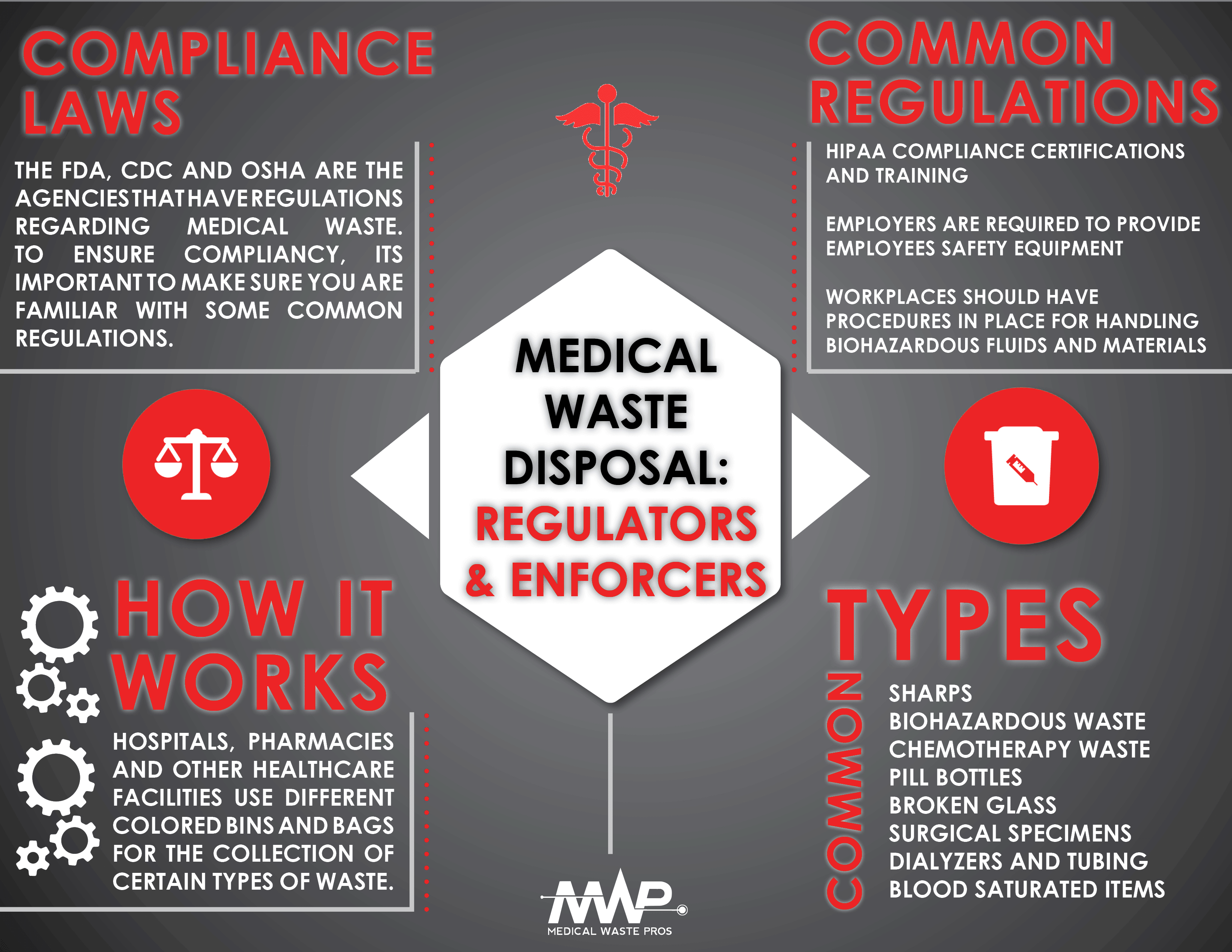Medical Waste Disposal: Regulators & Enforcers

Medical waste is waste that’s been contaminated by blood, body fluids, or other potentially infectious materials, as a result posing a risk of transmitting infection.
Common medical waste producers or generators include:
- Hospitals
- Health clinics
- Physician offices
- Dental practices
- Home health care
- Veterinary clinics
- Nursing homes
To learn what different types of medical waste there are and which agencies or laws they are regulated by, watch the video or read the transcript below.
Video Transcript
Different Types of Medical Waste
|
Pathological Waste
|
Human Blood & Blood Products
|
Microbiological Waste
|
|
Sharps
|
HIghly-Communicable Isolation Waste
|
Animal-Related Waste
|
Medical Waste Disposal Regulators & Enforcers
There’s a wide range of medical waste disposal regulations in healthcare, and to make things even more complicated, many of them are regulated by different authorities, including:
- The Environmental Protection Agency (EPA)
- The Occupational Safety and Health Administration (OSHA)
- State-Specific Medical Waste Regulations
 The U.S. Environmental Protection Agency
The U.S. Environmental Protection Agency
Since improper disposal of medical waste can have dangerous consequences for public and environmental health, the EPA is often involved in the regulation of medical waste disposal.
Several laws have been implemented for the EPA to regulate medical waste, and each focuses on a specific type of medical waste or disposal emission. Laws include:
- The Clean Air Act
- The Clean Water Act
- The Toxic Substances Control Act (TSCA)
- The Resource Conservation and Recovery Act (RCRA)
- The Emergency Planning and Community Right-to-Know Act (EPCRA)
The U.S. Occupational Health and Safety Administration
OSHA regulation medical waste under the Bloodborne Pathogens Standard, which is primarily designed to protect workers against the health hazards posed by bloodborne pathogens in the workplace.
The standard requires all facilities to protect workers by developing an exposure control plan and implementing other safeguards, including:
- Hepatitis B vaccination
- Universal precautions
- Personal protective equipment
- Post-exposure follow-up
- Hazard communication and training
- Engineering and work practice controls
 State-By-State Regulations
State-By-State Regulations
Adding to the complexity, nearly all 50 states have enacted some form of medical waste regulations and requirements for rendering medical waste non-infectious.
While half of the states still allow enforcement of federal OSHA regulations, this doesn’t include other regulations from state environmental protection agencies for example, meaning medical waste disposal regulations can still overlap and vary widely from state to state.
How to Safely Dispose Medical Waste
- The disposal process begins by initially collecting the waste for disposal. Many waste types like sharps need to be collected separately.
- After facilities are ready to dispose their waste, they can either send the waste in with a mail back disposal service or instead have a disposal provider come to their location to pick it up.
- Medical waste is treated to render it non-infectious using various methods including autoclaving, incineration, sterilization, and decontamination.
- Once waste has been treated, disposal service providers are able to provide documentation for definitive proof of proper disposal as well as written standards for their operating procedures.
Need Safe & Compliant Medical Waste Disposal?
Medical Waste Pros can help you reduce the risk of noncompliance with our network of secure medical waste disposal partners. To get started, fill out our form or give us a call at (888) 755-6370 for a free quote from providers in your area.










